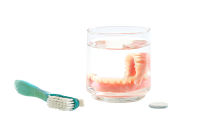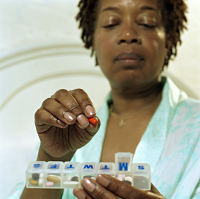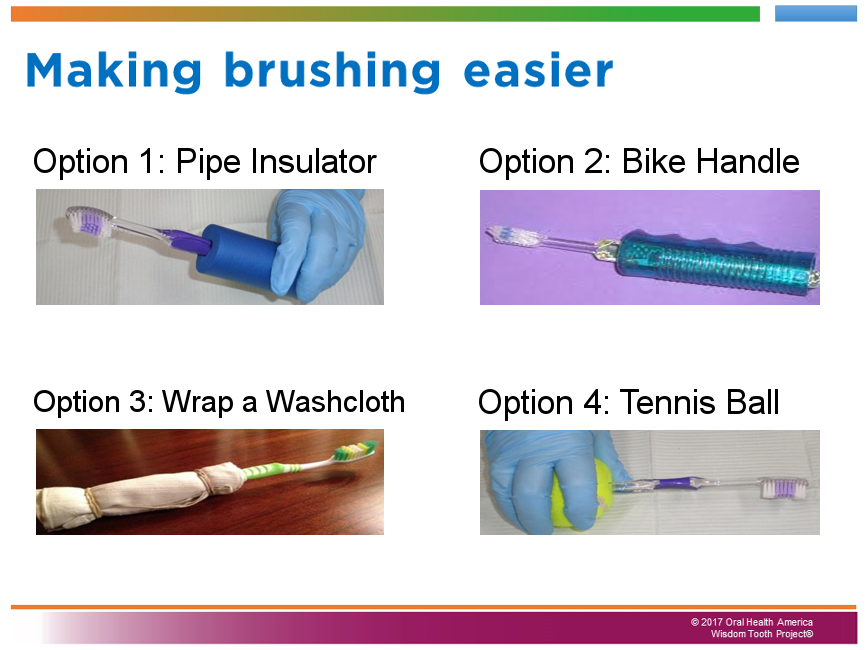As you age, it is important to keep your mouth and teeth healthy
The health of your mouth affects your overall health. Keeping your mouth healthy helps keep the bacteria from your mouth from entering your body. They help you chew and eat healthy foods, and help you smile, talk, and laugh.
Learn more about oral health among older adults in Oregon.
Continue to see a dental professional
Keep seeing a dental professional even if you don’t have teeth. The dental professional will check your mouth and throat for cancer. They will help you to keep any teeth you still have, healthy. They will help to make sure that your partials or dentures fit well.
Find low cost dental care
Dental care through OHP
Oral cancer
Most oral cancers are diagnosed in older adults. The average age of diagnosis is 62 years. Combined tobacco and alcohol use increases your chance of getting oral cancer.
To reduce your chance of getting oral cancer:
- Avoid tobacco products (cigarettes, e-cigarettes, “chew,” and hookah).
- Limit alcohol use.
- See a dental professional at least annually for oral cancer screenings.
Caring for dentures and partials
Dentures and partials should fit well and not cause pain. If they do not fit well you may get mouth sores, and be unable to eat healthy food.

Clean dentures daily to remove food and bacteria. Clean with an approved denture cleaner, or a mild hand soap. Do not use toothpaste, it may be scratch the dentures. These scratches can collect bacteria.
Remove dentures or partials every night. This lets your mouth tissues rest from the pressure of the denture and helps keep you from bacterial or yeast infections.
Soak dentures in water overnight. This keeps them from drying out.
Oral health and dry mouth
Dry mouth increases the risk of cavities. Saliva’s moisture and minerals protect the teeth. Dry mouth is not part of aging. Over 400 commonly used medications can cause dry mouth. Dry mouth can also be caused by certain diseases and head and neck cancer treatments.
If your medications are causing dry mouth:
- Ask your doctor about changing medications, if possible.

- Drink more water.
- Chew sugar-free gum with Xylitol.
- Use saliva replacements.
- Use alcohol-free fluoride mouth rinses.
Healthy eating tips
- Eat fruits and vegetables, healthy grains, protein, and healthy fats.
- Tell your doctor, dentist, or care provider if you have pain in your mouth or pain when chewing.
- Limit sugary drinks and desserts.
Tips for daily brushing
Daily brushing and cleaning in-between the teeth is an important step in maintaining a healthy mouth. Caregivers should help with daily oral care routines for older adults who are unable to perform these tasks themselves.
Brush twice a day with a fluoride toothpaste.
Use floss or floss-aid to clean in-between teeth.
If brushing is difficult:
- Wrap and tape a washcloth around a toothbrush handle.
- Use an electric toothbrush.
- Cut a small hole in a tennis ball and insert the toothbrush handle.

Photo courtesy of Oral Health America's Wisdom Tooth Project, "Older Adult Oral Health Education Curriculum, Tooth Wisdom®: Get Smart About Your Mouth."
Oral health and medical conditions
Some medical conditions are linked with poor oral health. If you are a person with diabetes it may be harder to manage if you have gum disease. Also, the gum disease may be harder to treat if the diabetes is not stable. Other medical conditions most commonly linked with poor oral health are:
- Heart health
- Respiratory (lung) health
- HIV
- Obesity
For more information, see “Oral health and other medical conditions.”